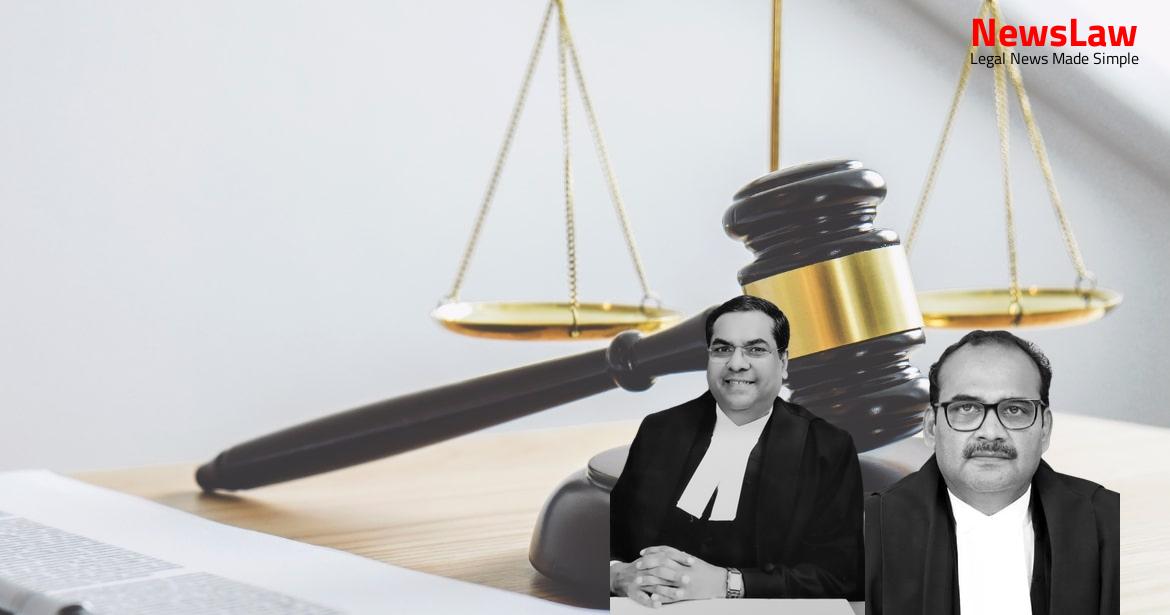Delve into a compelling legal case where the court’s meticulous analysis distinguished between a sale agreement and a loan agreement. The courts’ thorough examination and conclusions highlight the importance of clarity in contract interpretation within the realm of law.
Facts
- The learned trial Court held the agreement valid between Gurmeet Singh and Jai Parkash.
- The trial Court acknowledged the payment of Rs. 3,50,000 by Jai Parkash to Gurmeet Singh.
- However, the trial Court refused the relief of specific performance, suggesting the agreement may be a security document for a loan.
- The first appellate Court overturned the trial Court’s decision, stating the agreement is not a loan agreement but a valid agreement to sell.
- The defendants appealed to the High Court after the first appellate Court granted specific performance of the agreement.
- Plaintiffs reached the office of Sub Registrar with balance sale consideration on 10.02.2005.
- Rs. 3,50,000 was paid as earnest money to Gurmeet Singh.
- Defendants claimed Gurmeet Singh’s thumb impressions were obtained on blank papers.
- Plaintiffs marked their presence by moving an application before the Sub Registrar, attested by him.
- Plaintiffs served registered legal notice on 18.02.2005, replied by defendants denying execution of the agreement.
- Defendants resisted the suit by filing a written statement but did not appear at the Sub Registrar’s office.
- Plaintiffs filed Civil Suit No 681 of 2005 for specific performance and possession.
- Parties led their evidence with a target date for execution of the sale deed fixed as 10.02.2005.
- Agreement stated vendee entitled to double the earnest money or alternative execution through court if vendor fails.
- Plaintiffs had to perform after vendee’s death and approached defendants for agreement performance.
- Legal notice served on 14.01.2005 to defendants for sale deed execution on 10.02.2005.
- Defendants also denied receiving Rs. 3,50,000 from plaintiffs.
Also Read: Ruling on Circumstantial Evidence in Murder Case
Arguments
- Concurrent findings of facts recorded by all courts below on the execution of the agreement executed by Gurmeet Singh in favor of Jai Parkash.
- The agreement dated 11.02.2004 was described as a loan agreement/security document due to the marriage expenses of Gurmeet Singh’s daughter.
- The substantial amount alleged to have been paid without possession suggests the agreement should be treated as a security document/loan agreement.
- The defendants continued to be in possession despite the agreement stating possession was handed over to the vendee.
- The appellants argue that the sale consideration mentioned in the agreement was mostly paid by the vendee.
- The suit land being agricultural is the only source of income for the defendants and their family, invoking Section 20 of the Specific Relief Act for discretionary relief in their favor.
- Trial Court passed a decree for return of earnest money instead of specific performance.
- Original plaintiffs appealed against the refusal of specific performance.
- All courts below believed in the payment of sale consideration by the vendee to the vendor.
- Defendants never claimed before the trial Court that the agreement was a loan agreement or security document.
- Defendants did not appeal against the findings on the execution of the agreement and payment of Rs. 3,50,000.
Also Read: Challenging Legal Presumptions in Negotiable Instrument Cases
Analysis
- Both the first appellate Court and the High Court concluded that the agreement dated 11.02.2004 cannot be considered a loan agreement or security document.
- The defendants initially claimed the agreement was a loan agreement/security document only during the first appellate Court proceedings.
- All lower courts confirmed the execution of the agreement by Gurmeet Singh in favor of Jai Parkash, along with the payment of Rs.3,50,000 as part sale consideration.
- The trial Court denied specific performance based on a possible security document interpretation, which was not upheld by the higher courts.
- Defendants did not challenge the execution and payment findings from the trial Court.
- The first appellate Court and the High Court rightly upheld the decree of specific performance, emphasizing the sale agreement nature of the document.
- The trial Court firmly established the validity of the agreement as a sale agreement, further supported by additional courts.
- Even though the purpose of the sale was stated as marriage expenses, the overall document clearly indicated an agreement to sell and not a loan/security document.
- Defendants initially denied executing the agreement and receiving Rs.3,50,000, which was later refuted by all courts.
- The loan agreement/security document claim surfaced only during the first appellate Court proceedings.
- The agreement was consistently upheld as an agreement to sell by all courts involved.
- The execution of the agreement to sell was believed to have taken place
- Jai Parkash and the original plaintiffs were willing and ready to perform their part under the agreement
- They were present before the Sub Registrar on the specified date
- Decree for specific performance was rightly passed by the first appellate Court
- The decree was rightly confirmed by the High Court
- Sections 20(a) & (c) of the Specific Relief Act are not applicable in this case
Also Read: Legal Analysis Critique in High Court’s Quashing Order
Decision
- The appellate Court and High Court’s view is agreed upon.
- Original plaintiffs directed to pay additional Rs.3,50,000/- to the original defendants.
- Original defendants to receive Rs.50,000/- with 6% interest from 11.02.2004 as balance sale consideration.
- On receiving payment, original defendants to execute sale deed in favor of original plaintiffs.
- The appeal is dismissed and no costs are awarded.
Case Title: KIRPAL KAUR Vs. RITESH (2022 INSC 323)
Case Number: C.A. No.-001991-001991 / 2022



